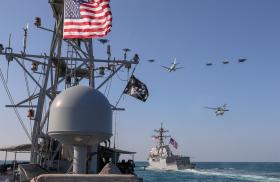
Is Syria Russia's New Afghanistan?

October 16, 2015
A year after the American-led international coalition against the Islamic State (ISIS) began its airstrikes in Syria and over 7,000 attacks later, U.S. President Barack Obama has come to realize that the air campaign in Syria will not achieve any of the coalition’s objectives. The new Russian intervention in Syria will not add anything new to what the United States has done so far. Since the current Russian airstrikes in Syria are pursuing the same failed strategy, they will only exacerbate the plight of the Syrian people who have been reeling under the weight of war and its woes for five years. Therefore, it is worth examining what is driving President Vladimir Putin’s latest adventure in Syria.
The Russian economy is suffering due to the international isolation of Moscow and the international economic sanctions, which were slapped on Russia’s economy after it had annexed the Crimean Peninsula in 2014. The current military intervention will increase the output of Russia’s warfare facilities, thereby creating more job opportunities for Russians and helping the Russian economy recover. Moreover, intervention on an international stage will break Moscow’s isolation, imposed upon it by the European Union. The United States has often employed similar tactics, providing a boost to the domestic economy by purchasing from arms producers, who rely on wars to keep their facilities running.
During an interview with Steven Pifer, director of the Brookings Arms Control and Non-Proliferation Initiative and former U.S. Ambassador to Ukraine, he noted that Moscow’s intervention in Syria gives the country a chance to replace its old weapons—a process it had been unable to carry out since the 1990s due to insufficient funds: “Russia wants to kill two birds with one stone: Support Assad’s regime and at the same time use those weapons to renew [its supplies].”
Moreover, Moscow has entered the war after asking a question that the West has yet to answer: “What will come next after Assad?” In other words, what strategy will be adopted in post-Assad Syria? Through intervention in Syria, Moscow is attempting to broadcast to Washington that the Arab spring yielded nothing but instability because of US political gambling and short-sightedness. If Russia is the chance, it will prove that the United States was wrongand that Russia is the country that deserves to play a role on the international scene.
Russian officials have stated that Moscow’s airstrikes are targeting ISIS, but on the ground, the airstrikes support the regime of Bashar al-Assad and pave the way for it to recapture its lost territories. This means that Assad’s regime lacks strength and the upper hand in the Syrian war. All fighting factions in Syria have equal strength on the battlefield: the combination of Assad’s forces, the anti-regime Free Syrian Army, Jabhat al-Nusra, ISIS, Ahrar al-Sham, and Kurdish separatist fighters make it difficult to predict the war’s results. With disparate sides running around in circles on the Syrian battlefield, Russian airstrikes, like earlier US strikes will fail to settle or shape the direction of the war.
Moreover, it is difficult for Russia to fight anti-government forces effectively because they are unofficial militias located in populated areas. While the airstrikes are unlikely to achieve any military objectives, experts expect them to result in a huge number of civilian casualties. As the war continues, Russia will be forced to withdraw under pressure from the international community and Russian citizens.
As the war in Syria drags on, Putin will ultimately be forced to halt Russian airstrikes, and further escalation appears highly unlikely. It is doubtful that Putin is mad enough to dispatch combat forces in order to settle the Syrian battle. History shows that no one has come out of military invasions victorious. The U.S. forces–considered the most powerful in the world—has failed to triumph. On the contrary, the United States suffered huge losses in Vietnam and Iraq. And despite the U.S.S.R.’s great military capabilities at the time, it could not attain victory in Afghanistan. Hence, if Putin sends combat troops, Syria may become Moscow’s new Afghanistan.
For these reasons, Putin, who’s seeking to lock horns with the United States, is expected to fail. His failure to settle the battle in Syria will be a setback for the role Moscow is trying to play in countries that were swept by the Arab Spring. Russia’s failure will be a victory for Washington without having to enter the bloodshed in Syria. This is Obama’s policy: Achieving gains without involving the U.S. directly or defeating its rivals by dragging them into a battle where no parties can win.


